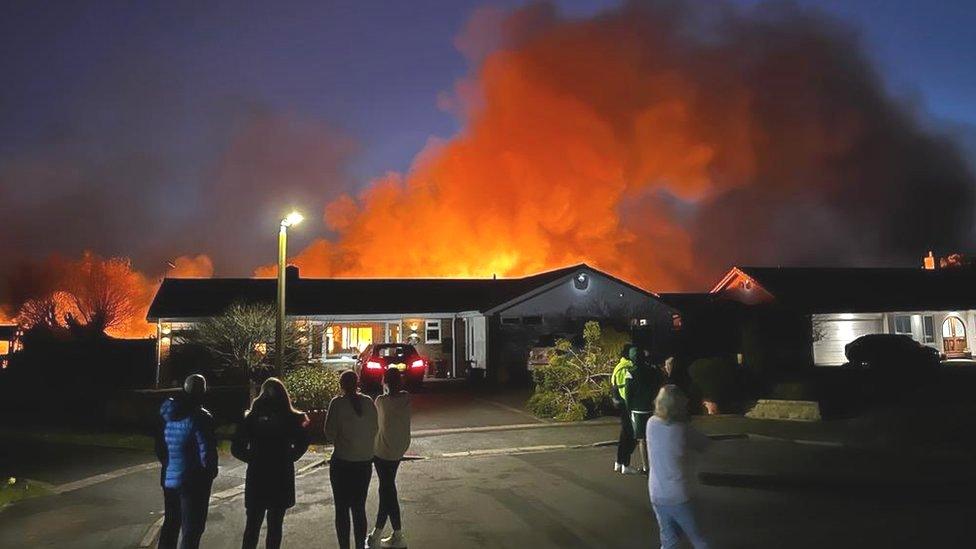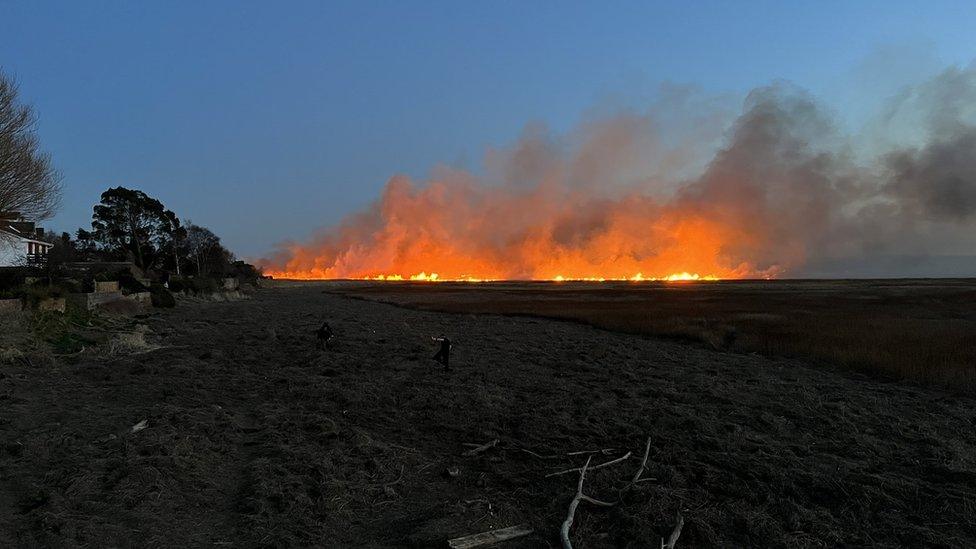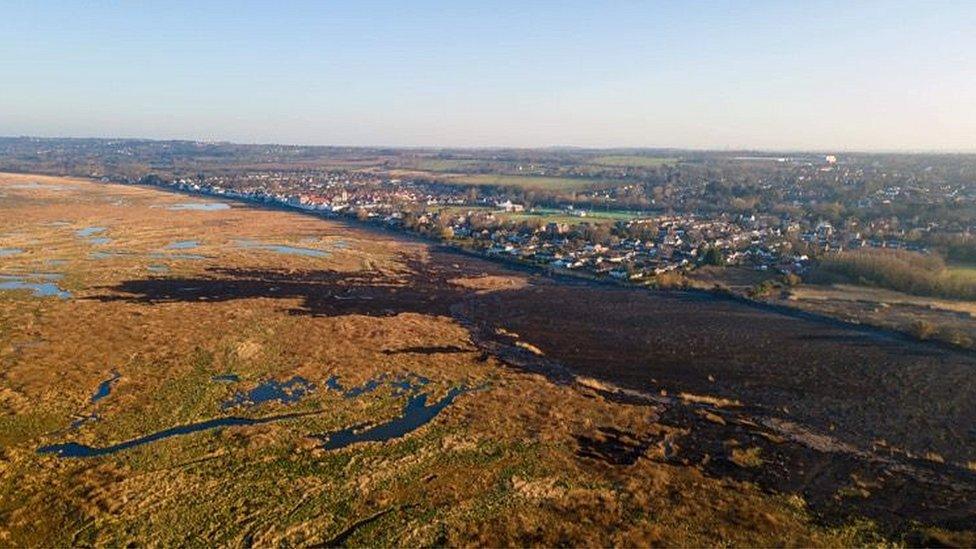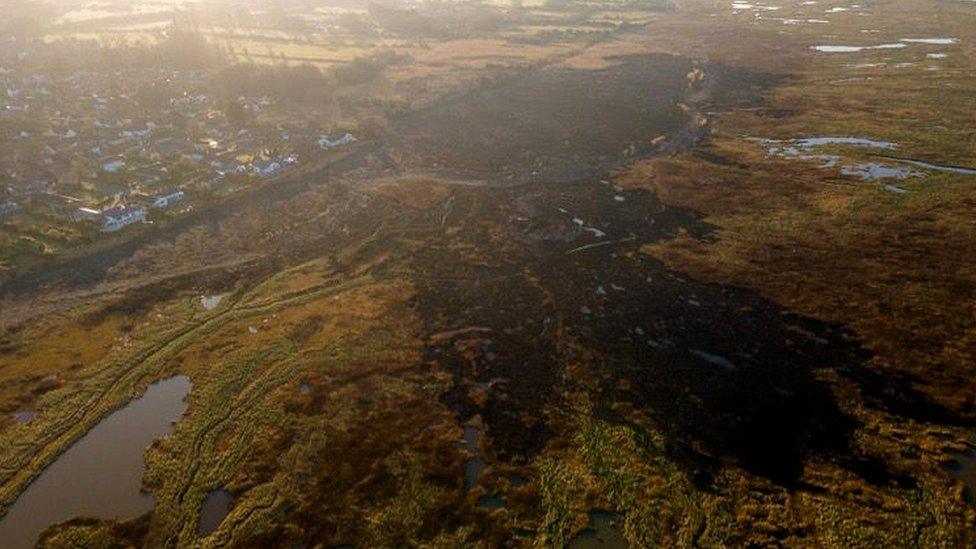Wirral marshland fire may have been started deliberately
- Published
Watch: Video shows fire spreading across Wirral marshland
A large fire on marshland on the Wirral Peninsula is thought to have been started deliberately.
Cheshire Fire Service sent six fire engines to the blaze at Neston after it started just before 18:30 GMT on Saturday.
The fire covered about 1 sq km (0.4 sq miles) and was "mainly extinguished" by midnight, the fire service said.
Cheshire Police said they were keen to speak to a group of teenagers regarding the fire.
They said three boys and a girl, aged between 14 and 15, were seen in the area when the blaze began.
They said the girl had long dark hair and was wearing a dark jacket and two boys were wearing dark jackets, while the third boy was wearing a light blue jacket and trousers.

Hundreds of residents and pubgoers came out to see the fire
A police spokeswoman said investigators believed the fire was caused deliberately and they were treating it as arson.
Eyewitness Peter Guy, 43, who was visiting nearby Parkgate on a day trip, said he had just finished having fish and chips when he noticed the fire.
He said there was no explosion, but the fire took hold rapidly, creating a "wall of flames" across the marshland.
"It started off looking like a regular bonfire and then I noticed the fire getting closer to us," he said.

The fire started out small before the flames spread across the marshland, said an eyewitness
"There were so many people there enjoying the beautiful sunset. I've never seen anything like it. It was like the sky was on fire."
On Saturday evening, the fire service said there were two areas of fire spreading around the marshland, a site of special scientific interest.
Fire breaks were put in place to protect nearby properties.
Allow X content?
This article contains content provided by X. We ask for your permission before anything is loaded, as they may be using cookies and other technologies. You may want to read X’s cookie policy, external and privacy policy, external before accepting. To view this content choose ‘accept and continue’.

By 22:00 GMT the huge flames had died down along with the crowds, which earlier lined the Parkgate front, said the BBC's Jon Ironmonger who was at the scene.
Hundreds of pubgoers and residents spilled onto the seawall to see the fire, which surged across marshland in the Dee estuary.
Cheshire Police said it had received a report about a man being attacked while trying to disperse spectators.
A spokeswoman said he sustained a minor injury to his lip.
By midnight, all but one fire engine had been withdrawn to safety as the tide came in, with the fire mainly extinguished.
By 07:00 on Sunday, crews confirmed the fire was out by carrying out a sweep of the area with a thermal imaging camera.

The fire scorched a significant section of marshland

Fire crews said the blaze covered about a square kilometre of the area
A spokeswoman for RSPB, which owns the nature reserve, said: "We're shocked and saddened by the fire that has devastated the Neston Reedbed part of our reserve."
She said marsh harriers were "beginning to build their nests on the marshland which has sadly been lost to fire".
The reserve hosts wildlife, including bearded tits, Cetti's warblers and bittern.
The RSPB said the scale of the damage was being assessed and thanked the emergency services for their response.
Chris Tynan, from RSPB Liverpool, added that the Dee estuary was "internationally important" and "one of the top 10 river estuaries in the UK".
"There's a huge numbers of birds that come in there because it's got lots of food, it's got lots of habitat. If you dig down into the mud levels, the invertebrates, the food sources… are phenomenal."

Why not follow BBC North West on Facebook, external, Twitter, external and Instagram, external? You can also send story ideas to northwest.newsonline@bbc.co.uk, external